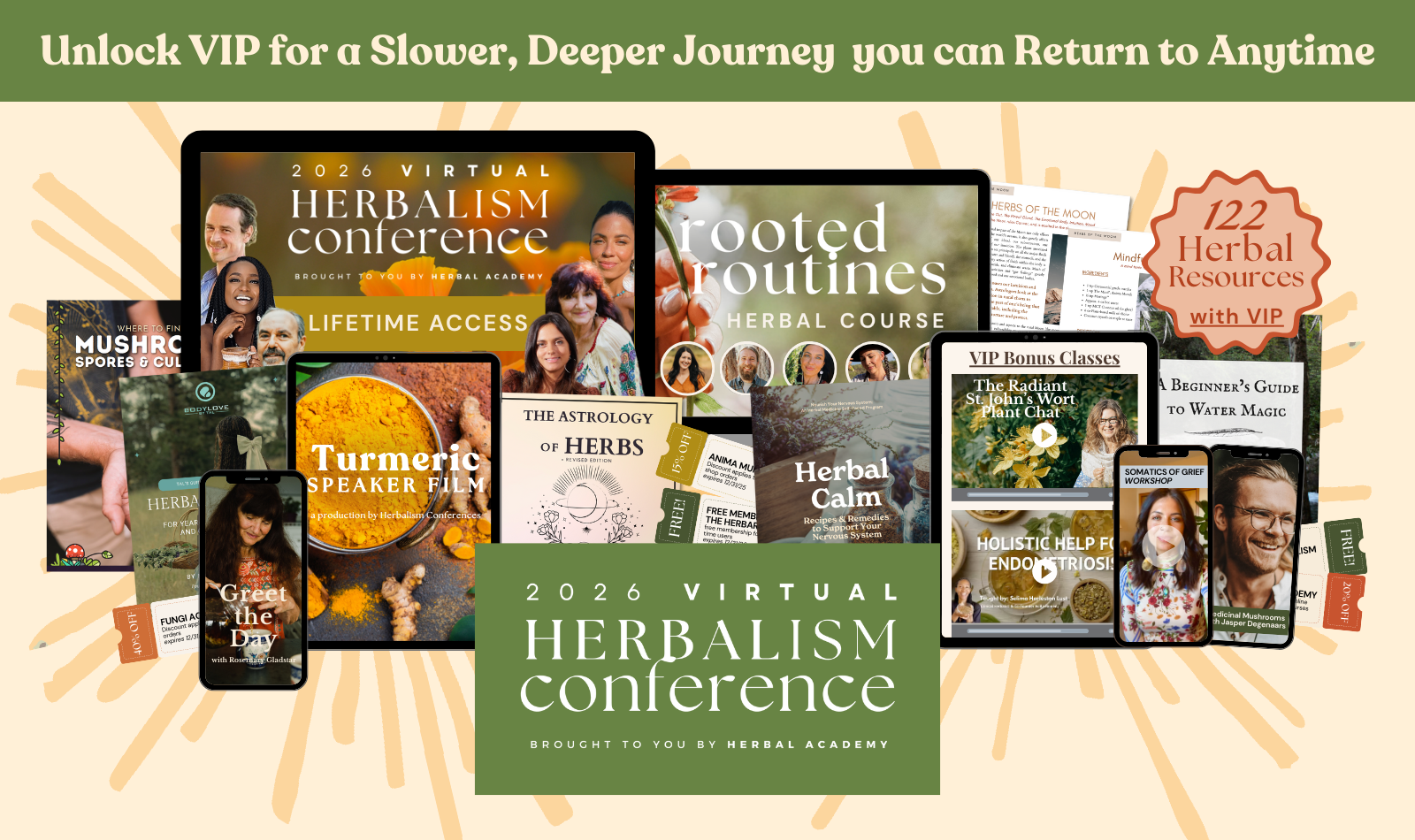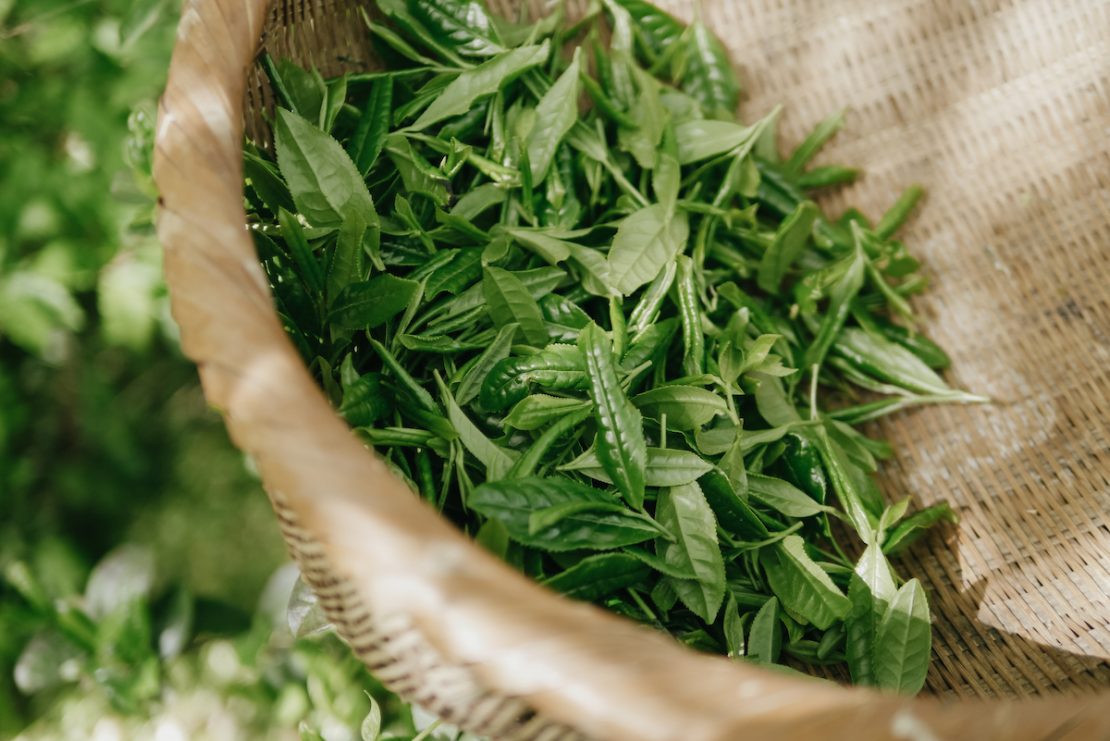
Herbs for Dementia, Alzheimer’s Disease, and the Aging Brain: What the Research Has to Say
Most of us will be touched by the heartbreak of Alzheimer’s disease or dementia. Whether a parent, life partner, friend, or oneself, we face the slow loss of loved ones and difficult decisions about care. Research on herbs for dementia offers a ray of hope in this dark landscape.
Research has focused on plants with antioxidant, anti-inflammatory, adaptogenic, nootropic, and neuroprotective actions that support brain health and address risk factors for dementia (Abascal & Yarnell, 2011; Tewari et al., 2018). Overall, the research is promising.
A systematic review of human trials was conducted to assess the effectiveness of herbs for dementia, including a meta-analysis on cognitive effects. All studies reviewed showed that herbs had significant impacts in improving symptoms with no severe adverse events (May et al., 2009). Together the studies “provide overall positive evidence for the effectiveness and safety of certain herbal medicines for dementia management” (May et al., 2009, p. 447). Clinical research is ongoing, as is the call for larger, well-designed studies (Tewari et al., 2018).
Herbs for Dementia
The herbs discussed here have been tested in clinical trials and offer hope for people with dementia.
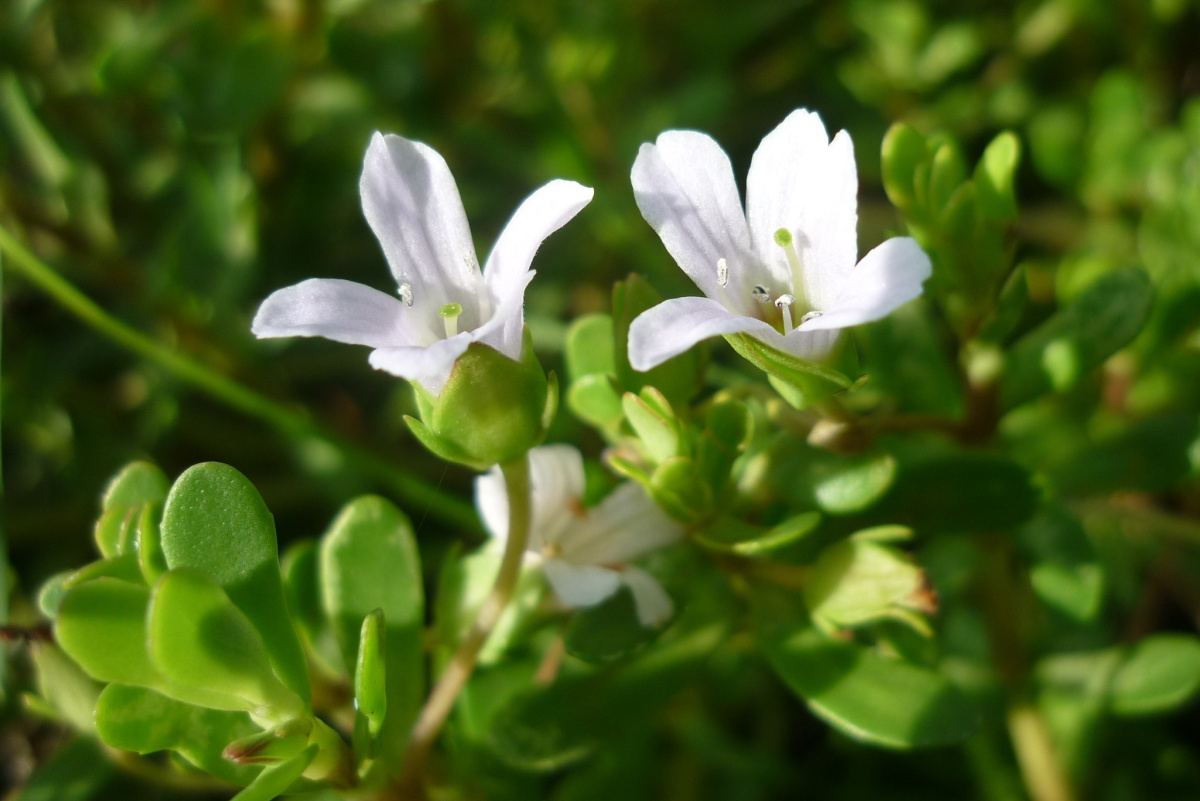
Bacopa (Bacopa monnieri)
In the Ayurvedic tradition, bacopa is a rasayana, meaning a plant that revitalizes the whole body and slows aging (Winston & Maimes, 2007). Herbalists use bacopa as an antioxidant, adaptogen, antidepressant, anxiolytic, and nootropic (Abascal & Yarnell, 2011). In a clinical trial on healthy people, bacopa improved memory, and learning speed, and reduced anxiety (Stough et al., 2001). In another clinical trial on adults with memory impairment, bacopa improved memory and attention (Raghav et al., 2006).
Usage: Powdered herb: 5-10 g per day; tincture: 2-30 mL per day in divided doses (Abascal & Yarnell, 2011).
Safety: Bacopa is generally safe with no known contraindications. It can be irritating to the digestive system (Bone, 2003).
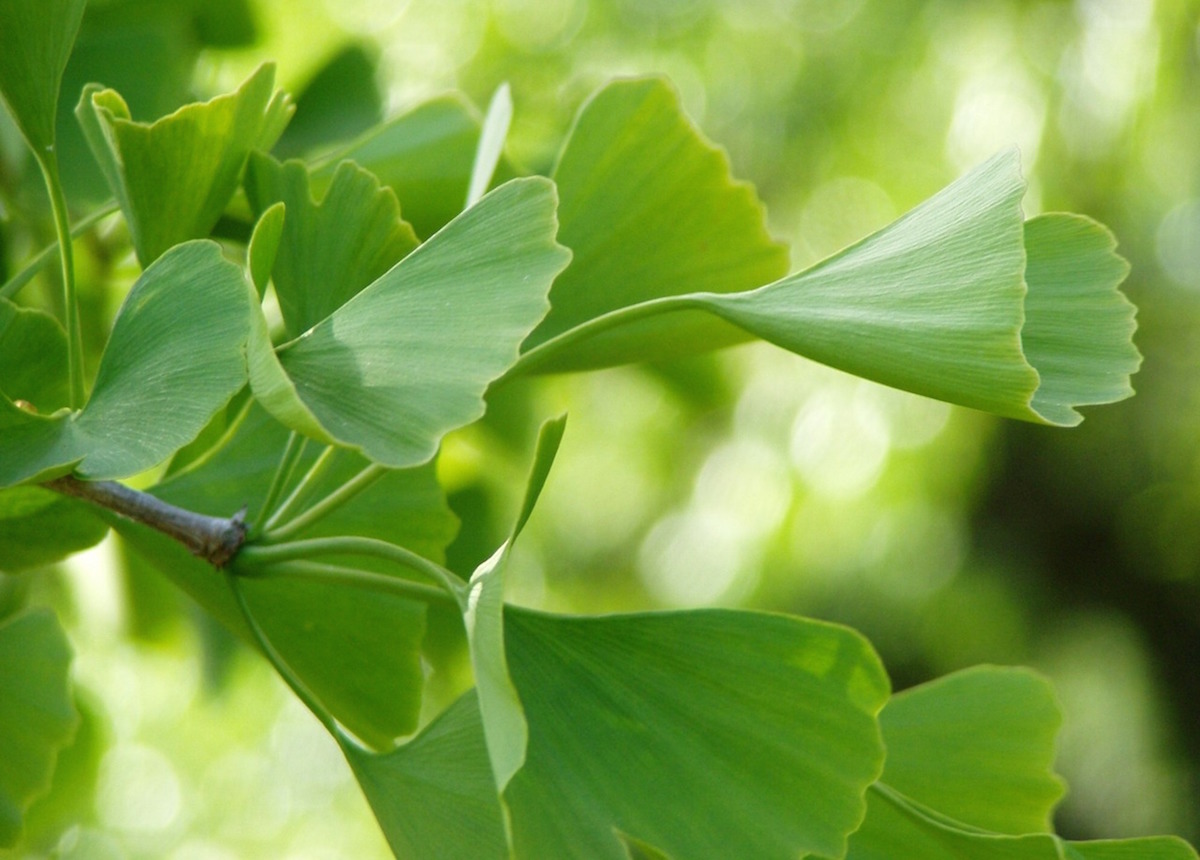
Ginkgo (Ginkgo biloba)
For centuries, ginkgo seeds were used as food in China (Perry & Howes, 2010). Later, leaf preparations were popularized to improve circulation and memory (Perry & Howes, 2010). Today, herbalists rely on ginkgo leaf as an antioxidant, circulatory stimulant, neuroprotective, and nootropic (Bone, 2003).
Ginkgo is one of the most researched herbs for dementia (Tewari et al., 2018). Clinical studies using standardized extracts have shown positive effects on attention and executive function in Alzheimer’s and vascular dementia (Perry & Howes, 2010). A large clinical trial has shown that a standardized extract of ginkgo may improve Alzheimer’s behavioral symptoms, decreasing apathy, lessening anxiety and irritability, and improving sleep (Scripnikov et al., 2007).
Usage: Infusion: 1 tablespoon per cup, 1-4 times per day; tincture: 1-3 mL, 1-4 times per day (Tilgner, 2009). Gingko may take up to 6 weeks before taking effect (Bone, 2003).
Safety: Gingko may interact with anticoagulants and should be used with caution or avoided with these medications (Bone, 2003).
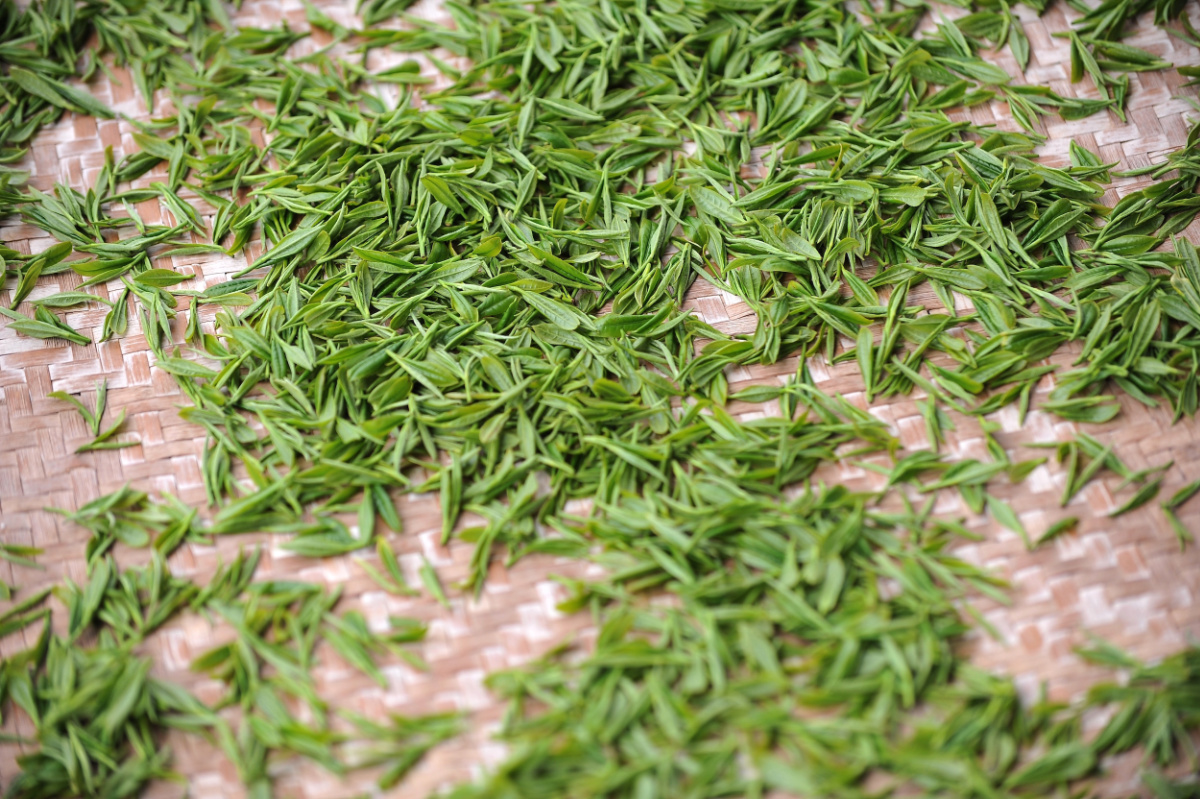
Green Tea (Camellia sinensis)
Green tea, the traditional beverage of China and Japan, now enjoys worldwide appeal. Green tea consumption is beneficial in conditions that increase the risk of dementia, including obesity, diabetes, and cardiovascular disease (Tewari et al., 2018).
As an antioxidant and anti-inflammatory (Mandel et al., 2011), green tea may help combat the oxidative stress and neuroinflammation characteristic of neurodegenerative diseases (Arslan et al., 2020; Olajide & Sarker, 2020). In one study, people with Alzheimer’s had reduced signs of oxidative stress when taking a combination of green tea and apple extract (Rubio-Perez et al., 2015). In another, people with mild cognitive impairment who consumed green tea extract and L-theanine, a compound found in green tea, showed significant improvements in memory and attention (Park et al., 2011). A study in Japan showed a 27% lower dementia risk in people who drank 5 cups of green tea per day (Tomata et al., 2016).
Usage: As a beverage, green tea may be consumed liberally in the diet. It may interact with some medications, including stimulants, sedatives, anticoagulants, and blood-clotting agents (Gaby, 2006).
Safety: Though rare, some evidence suggests green tea extracts can cause liver damage (Green tea, 2020).
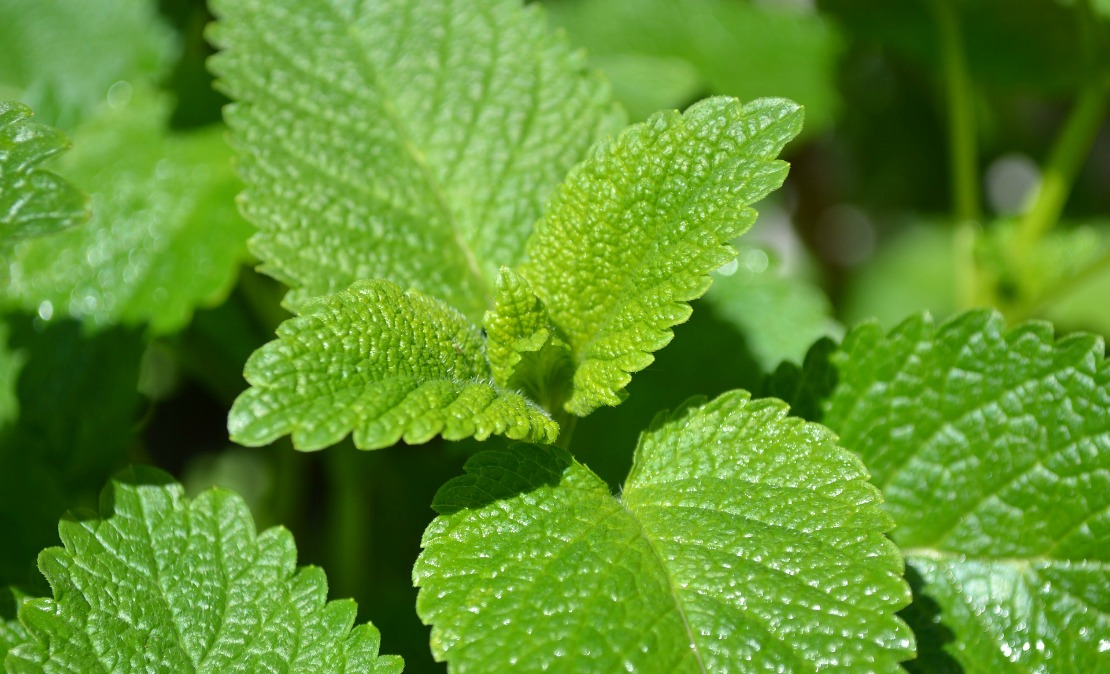
Lemon Balm (Melissa officinalis)
Lemon balm has a long history of use in Europe. Herbalists use lemon balm as a carminative, antispasmodic, antiviral, anxiolytic, and antidepressant (Bone, 2003). Research shows lemon balm improves memory, increases cognitive function, and reduces anxiety in healthy adults (Perry & Howes, 2010). In a study on Alzheimer’s, lemon balm reduced cognitive impairment (Akhondzadeh, 2003). . In another study, the essential oil reduced agitation in those with dementia (Ballard et al., 2002).
Usage: Infusion: 1-2 teaspoons per cup, 2-3 times per day; tincture: 4-5 mL up to 4 times per day (Winston & Maimes, 2007).
Safety: Lemon balm is generally safe. Large amounts may inhibit thyroid function and interact with thyroid medications (Winston & Maimes, 2007).
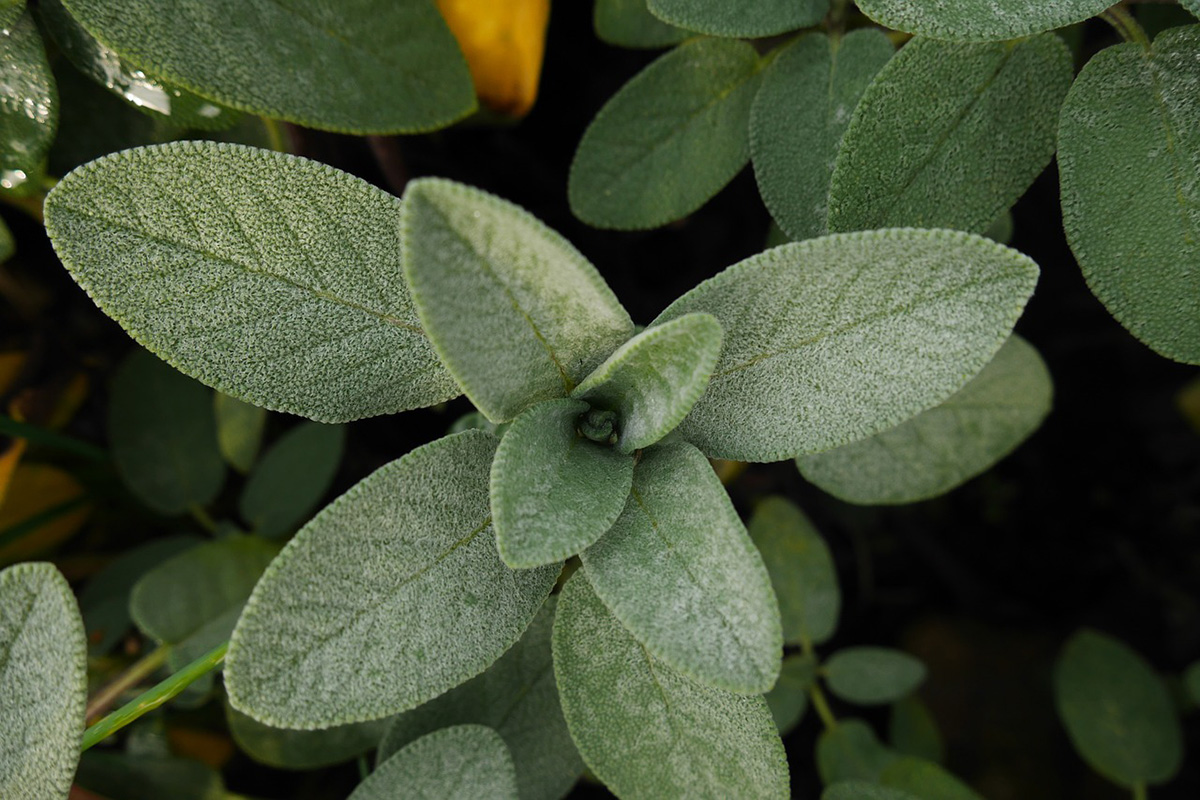
Sage (Salvia officinalis and Salvia lavandulifolia)
These two species of sage have been used in Europe since the 16th century to improve memory (Man et al., 2008). In a study in people with mild-to-moderate Alzheimer’s disease, sage tincture significantly impacted cognitive function (Akhondzadeh et al., 2003). More frequent agitation in the placebo group led researchers to conclude that sage may also reduce agitation in people with dementia (Akhondzadeh et al., 2003). Other studies with sage in healthy adults have shown enhanced memory and attention, reduced mental fatigue, and increased alertness (Perry & Howes, 2010; Scholey et al., 2008).
Usage: Infusion: 1 teaspoon per cup, 1-4 times per day (Tilgner, 2009). Tincture: 3-5 mL, 3 times per day (Abascal & Yarnell, 2004).
Safety: Some species of sage contain a toxic compound called thujone which, in large amounts, may cause seizures (Abascal & Yarnell, 2004). Due to the thujone content, do not exceed the recommended dose; sage is also contraindicated in pregnancy (Tilgner, 2009).

Turmeric (Curcuma longa)
Turmeric, the golden spice used in Indian cooking, plays a vital role in Ayurvedic medicine. Turmeric is an antioxidant and anti-inflammatory with positive effects on the cardiovascular system, including lowering cholesterol and blood pressure (Tilgner, 2009)—known risk factors for dementia (Alzheimer’s Association, 2021). In a review of natural antioxidants, researchers report that natural antioxidants including curcumin, the most well-researched compound in turmeric, may be effective for Alzheimer’s disease in elderly patients, though less so in severe diseases (Reddy et al., 2018).
In India, where turmeric is common in the diet, the rate of Alzheimer’s is less than one-quarter the rate in older adult populations in the United States (Chandra et al., 2001). This difference suggests that turmeric in the diet may reduce the risk of Alzheimer’s (Chandra et al., 2001). Turmeric also contains compounds that appear to directly impact the accumulation of proteins in the brain associated with Alzheimer’s (Zhang et al., 2018). However, to date, human clinical trials on people with dementia have not shown the hoped-for results (Zhang et al., 2018).
Usage: Powder: 1-3 teaspoons per day; tincture: 5 mL, 3 times per day (Abascal & Yarnell, 2004).
Safety: Avoid with anticoagulants, in pregnancy, and with bile duct obstruction (Tilgner, 2009).
Deciding Whether to Use Herbs for Dementia
Decisions about dementia care are complicated and deeply personal, especially as the disease progresses. Research suggests that herbs may support cognitive function and relieve behavioral symptoms of dementia. If you choose to employ herbs for dementia or Alzheimer’s, discuss your decision with your healthcare practitioner, start early, and be mindful of the potential for herb-drug interactions.
For more on dementia and Alzheimer’s, see:
What the Research Says About Essential Oils for Alzheimer’s and Dementia
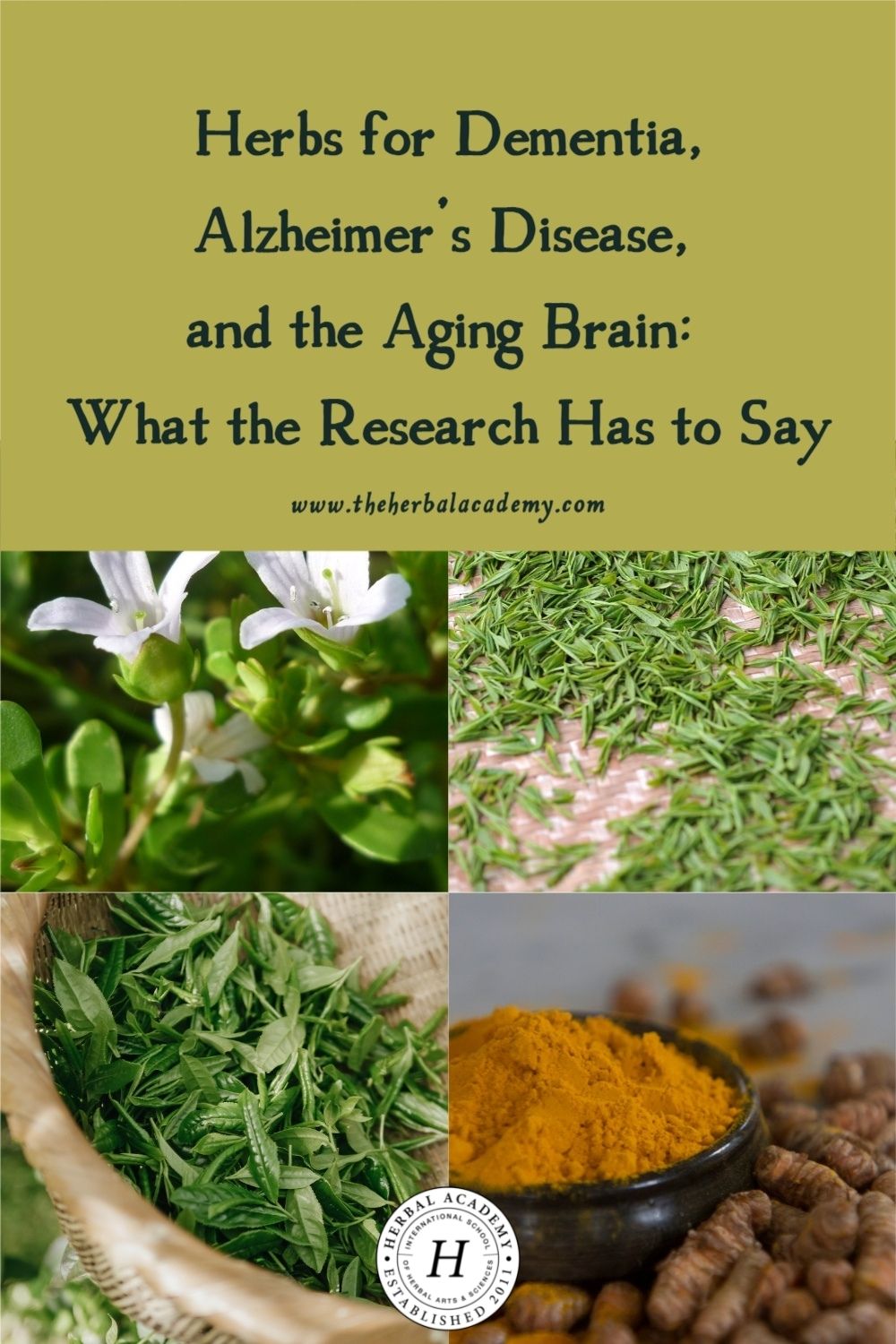
REFERENCES
Abascal, K., & Yarnell, E. (2004). Alzheimer’s disease: Part 2—a botanical treatment plan. Alternative and Complementary Therapies, 10(2), 67–72. https://doi.org/10.1089/107628004773933299
Abascal, K., & Yarnell, E. (2011). Bacopa for the brain: A smart addition to Western medicine. Alternative and Complementary Therapies, 17(1), 21–25. https://doi.org/10.1089/act.2011.17106
Akhondzadeh, S., Noroozian, M., Mohammadi, M., Ohadinia, S., Jamshidi, A.H., Khani, M. (2003). Melissa officinalis extract in the treatment of patients with mild to moderate Alzheimer’s disease: A double blind, randomised, placebo controlled trial. Journal of Neurology, Neurosurgery & Psychiatry, 74(7), 863–866. https://doi.org/10.1136/jnnp.74.7.863
Akhondzadeh, S., Noroozian, M., Mohammadi, M., Ohadinia, S., Jamshidi, A.H., & Khani, M. (2003). Salvia officinalis extract in the treatment of patients with mild to moderate Alzheimer’s disease: A double blind, randomized and placebo-controlled trial. Journal of Clinical Pharmacy and Therapeutics, 28(1), 53–59. https://doi.org/10.1046/j.1365-2710.2003.00463.x
Alzheimer’s Association (2021). 2021 Alzheimer’s disease facts and figures. Alzheimer’s Dement, 7(3).
Arslan, J., Jamshed, H., & Qureshi, H. (2020). Early detection and prevention of Alzheimer’s disease: Role of oxidative markers and natural antioxidants. Frontiers in Aging Neuroscience, 12. https://doi.org/10.3389/fnagi.2020.00231
Ballard, C.G., O’Brien, J.T., Reichelt, K., & Perry, E.K. (2002). Aromatherapy as a safe and effective treatment for the management of agitation in severe dementia: The results of a double-blind, placebo-controlled trial with Melissa. The Journal of Clinical Psychiatry, 63(7), 553–558. https://doi.org/10.4088/jcp.v63n0703
Bone, K. (2003). Clinical guide to blending liquid herbs: Herbal formulations for the individual patient. St. Louis, MO: Elsevier Churchill Livingstone.
Chandra, V., Pandav, R., Dodge, H.H., Johnston, J.M., Belle, S.H., DeKosky, S.T., & Ganguli, M. (2001). Incidence of Alzheimer’s disease in a rural community in India: The Indo-US Study. Neurology, 57(6), 985–989. https://doi.org/10.1212/wnl.57.6.985
Gaby, A. (Ed.) (2006). A-Z guide to drug-herb-vitamin interactions (2nd ed.). New York, NY: Three Rivers Press.
May, B., Lit, M., Xue, C.C., Yang, A.W., Zhang, A.L., Owens, M.D., … Story, D.F. (2009). Herbal medicine for dementia: A systematic review. Phytotherapy Research, 23(4), 447–459. https://doi.org/10.1002/ptr.2656
Man, S.C., Durairajan, S.S., Kum, W.F., Lu, J.H., Huang, J.D., Cheng, C.F., … Li, M. (2008). Systematic review on the efficacy and safety of herbal medicines for Alzheimer’s disease. Journal of Alzheimer’s Disease, 14(2), 209–223. https://doi.org/10.3233/jad-2008-14209
Mandel, S.A., Amit, T., Weinreb, O., & Youdim, M.B.H. (2011). Understanding the broad-spectrum neuroprotective action profile of green tea polyphenols in aging and neurodegenerative diseases. Journal of Alzheimer’s Disease, 25(2), 187–208. https://doi.org/10.3233/jad-2011-101803
Olajide, O.A., & Sarker, S.D. (2020). Alzheimer’s disease: Natural products as inhibitors of neuroinflammation. Inflammopharmacology, 28(6), 1439–1455. https://doi.org/10.1007/s10787-020-00751-1
Park, S.K., Jung, I.C., Lee, W.K., Lee, Y.S., Park, H.K., Go H.J., Kim, K. (2011). A combination of green tea extract and l-theanine improves memory and attention in subjects with mild cognitive impairment: A double-blind placebo-controlled study. Journal of Medicinal Food, 14(4), 334-343. https://doi.org/10.1089/jmf.2009.1374
Perry, E., & Howes, M.-J. R. (2010). Medicinal plants and dementia therapy: Herbal hopes for brain aging? CNS Neuroscience & Therapeutics, 17(6), 683–698. https://doi.org/10.1111/j.1755-5949.2010.00202.x
Raghav, S., Singh, H., Dalal, P.K., Srivastava, J.S., & Asthana, O.P. (2006). Randomized controlled trial of standardized Bacopa monniera extract in age-associated memory impairment. Indian Journal of Psychiatry, 48(4), 238–242. https://doi.org/10.4103/0019-5545.31555
Reddy, P.H., Manczak, M., Yin, X., Grady, M.C., Mitchell, A., Tonk, … Reddy, A.P. (2018). Protective effects of Indian spice curcumin against amyloid-β in Alzheimer’s disease. Journal of Alzheimer’s Disease, 61(3), 843–866. https://doi.org/10.3233/jad-170512
Rubio-Perez, J.M., Albaladejo, M.D., Zafrilla, P., Vidal-Guevara, M.L., & Morillas-Ruiz, J.M. (2015). Effects of an antioxidant beverage on biomarkers of oxidative stress in Alzheimer’s patients [Abstract]. European Journal of Nutrition, 55(6), 2105–2116. https://doi.org/10.1007/s00394-015-1024-9
Scholey, A.B., Tildesley, N.T., Ballard, C.G., Wesnes, K.A., Tasker, A., Perry, E.K., & Kennedy, D.O. (2008). An extract of Salvia (sage) with anticholinesterase properties improves memory and attention in healthy older volunteers. Psychopharmacology, 198(1), 127–139. https://doi.org/10.1007/s00213-008-1101-3
Scripnikov, A., Khomenko, A., Napryeyenko, O., & GINDEM-NP Study Group (2007). Effects of Ginkgo biloba extract EGb 761 on neuropsychiatric symptoms of dementia: Findings from a randomised controlled trial. Wiener medizinische Wochenschrift (1946), 157(13-14), 295–300. https://doi.org/10.1007/s10354-007-0427-5
Stough, C., Lloyd, J., Clarke, J., Downey, L.A., Hutchison, C.W., Rodgers, T., & Nathan, P.J. (2001). The chronic effects of an extract of Bacopa monniera (Brahmi) on cognitive function in healthy human subjects. Psychopharmacology, 156(4), 481–484. https://doi.org/10.1007/s002130100815
Tewari, D., Stankiewicz, A. M., Mocan, A., Tzvetkov, N.T., Huminiecki, L., Horbańczuk, J.O., & Atanasov, A.G. (2018). Ethnopharmacological approaches for dementia therapy and significance of natural products and herbal drugs. Frontiers in Aging Neuroscience, 10. https://doi.org/10.3389/fnagi.2018.00003
Tilgner, S. (2009). Herbal medicine: From the heart of the earth (2nd ed.). Pleasant Hill, OR: Wise Acres, LLC.
Tomata, Y., Sugiyama, K., Kaiho, Y., Honkura, K., Watanabe, T., Zhang, S., … Tsuji, I. (2016). Green tea consumption and the risk of incident dementia in elderly Japanese: The Ohsaki cohort 2006 study. The American Journal of Geriatric Psychiatry, 24(10), 881–889. https://doi.org/10.1016/j.jagp.2016.07.009
Green tea. (2020). Retrieved from https://www.ncbi.nlm.nih.gov/books/NBK547925/
Winston, D., Maimes, S. (2007). Adaptogens: Herbs for strength, stamina, and stress relief. Rochester, VT: Healing Arts Press.
Zhang, K., Chen, M., Du, Z.-Y., Zheng, X., Li, D.-L., & Zhou, R.-P. (2018). Use of curcumin in diagnosis, prevention, and treatment of Alzheimer’s disease. Neural Regeneration Research, 13(4), 742. https://doi.org/10.4103/1673-5374.230303

